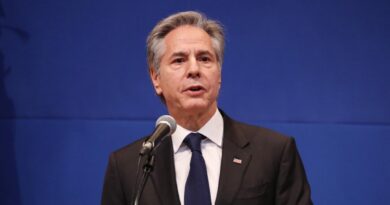Israel Halts Gaza Supplies Following Hamas’ Rejection of Cease-Fire Proposal
The terror group is currently holding around 25 Israeli hostages.
Israel has halted the entry of goods and supplies into the Gaza Strip after the Hamas terrorist group turned down a cease-fire proposal from the country.
“Israel will not agree to a cease-fire without the release of our hostages. If Hamas persists in their refusal, there will be additional repercussions.”
Hamas is believed to be holding another 25 hostages and the bodies of 30 individuals.
According to the proposal, Hamas is supposed to return half of all living and deceased hostages on the first day of the framework. If a permanent cease-fire agreement is reached, Hamas must release the rest of the hostages and bodies.
“While Israel has agreed to the Witkoff framework to secure the release of our hostages, Hamas has so far rejected this framework. If Hamas changes its stance, Israel will immediately engage in discussions regarding the specifics of the Witkoff framework,” stated the Prime Minister.
“Steve Witkoff developed the framework to extend the cease-fire after realizing that, currently, there was no chance of bridging the gaps between the sides on ending the conflict, and that more time was needed for negotiations on a permanent cease-fire.”
Negotiating Cease-Fire
Israeli Foreign Minister Gideon Saar expressed Israel’s readiness to negotiate the next phase, but emphasized that more hostages must be released during the negotiations. He revealed that Israel had received a side letter from the Biden administration stating that there was no automatic progression between the cease-fire phases.
“We fulfilled all our commitments [in Phase 1] until the final day, which was yesterday,” Saar noted during a press conference. “Our position is that hostages should be freed during negotiations.”
Hamas cautioned that any delay or cancellation of the cease-fire agreement would lead to “humanitarian consequences” for the hostages and reaffirmed that the only way to secure their release was by implementing the existing deal, which did not specify a timeline for freeing the remaining captives.
Hamas has expressed willingness to release all hostages at once in Phase Two, but on the condition of the release of more Palestinian prisoners, a permanent cease-fire, and the withdrawal of Israeli forces.
Israel is hesitant to withdraw from the Philadelphi Corridor, its buffer zone between Egypt and Gaza. Under the terms of the cease-fire, Israel was expected to reduce its presence in the corridor during Phase 1 and completely withdraw in Phase 2.
However, an Israeli official stated this week that the country will refrain from pulling out of the area to prevent Hamas from smuggling arms into Gaza.
Previously, Defense Minister Israel Katz declared that he had instructed the Israel Defense Forces (IDF) to expand operations in the refugee camps of Nur al-Shams, Jenin, and Tulkarem. Tanks were sent into the West Bank by the IDF on Feb. 23, marking the first instance in over two decades.
Reuters and the Associated Press contributed to the report.





